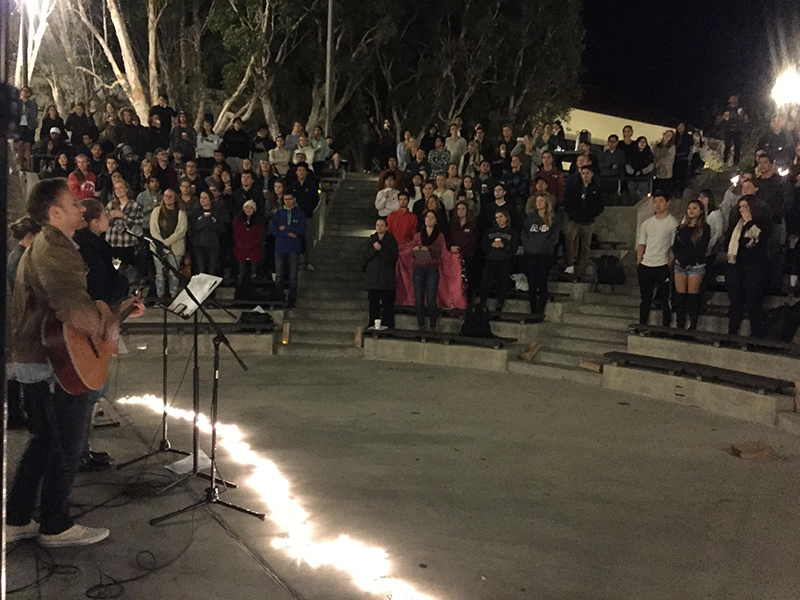
Move over ring-by-spring, there’s a new romantic phenomenon at Pepperdine: “Abroad goggles.”
Pepperdine is ranked No. 1 in the nation for its abroad programs. Two out of three students will study abroad at least once during their four years as an undergraduate, spending a semester or two living and attending classes together in one cozy house and travelling together in small groups most weekends.
It’s no surprise that many romantic relationships spark overseas. However, more often than not, the intense romantic relationships that start abroad don’t always last once getting back to the Malibu campus.
“Overseas is a fantasy world,” International Programs Dean Charles Hall said. “It isn’t day-to-day life. You come back to Malibu and you get back into your normal routine. Interests and likes become more diversified, the person you thought you knew abroad can be someone totally different than you thought. Our social context changes (abroad) and our personality changes too.”
Relationships that start overseas have additional hurdles, including the intensity of living together, the “abroad goggles” phenomenon that throws people together who wouldn’t otherwise date, and the challenge of maintaining the relationship while assimilating back into the Malibu culture.
A whole new world: abroad intensity
Travel opens up new worlds — and for many Pepperdine students, new relationships.
“It’s a very intense time,” said Sarah Ballard, an interpersonal communication professor. “When you have all sorts of really huge adventures you have romanticism involved. When you’re emotionally heightened because you’re having this amazing abroad experience, it also heightens the intensity of the relationships you have.”
That intensity is difficult to match when students come back to Malibu.
“You get into a bit of an artificial experience because it isn’t your day-to-day and I think you kind of feel safer and less inhibited to explore lots of things,” said Bert Ballard, a professor of interpersonal communication. “But at the same time that environment fosters more genuineness in a sense of who you are. When you come back there are parts that we talk about and parts of us that we hide and when you’re abroad everything is new and fresh and you start to share parts of who you are that you wouldn’t normally share.”
Life in the casa
Of the seven abroad programs, Florence, Lausanne, Heidelberg, London, Shanghai, Washington, D.C., and Buenos Aires, all but Buenos Aires have a house that the students live in. This creates a petri dish of 40 to 70 students living in one house together, all the time. Students see each other in every form; from just waking up for class to pulling an all-nighter in the library.
“You’re in this kind of bubble of intensity of individual growth and because of the nature of living together you’re interacting with the same people a lot,” said Hannah Parmelee, the Relationship IQ director with the Boone Center for the Family. “When romantic relationships form sometimes it has more to do with proximity. People sometimes get caught up in the romance of abroad because there is so much time for togetherness and you get to be with this person all the time.”
Many students agreed that with there are positives and negatives to being thrust into a living situation with someone and then trying to date.
“It’s weird being around people all the time,” said Grant McCutchen, a junior philosophy major who studied and dated in Lausanne. “There’s a certain stress involved with being around certain people that you care about. Having to deal with that stress all the time is a little nerve-racking. You can’t get away from a bad situation.”
Abroad goggles
With such a small group dynamic, the options for who to date are slim. The Ballards were the abroad faculty family for the Shanghai program for the 2014-2015 academic year. They had roughly 16 males in the program and the rest were female. But there was anywhere from nine to 11 relationships during their time in the house.
The small selection can create relationships that would otherwise not happen if the same people were in Malibu, Sarah Ballard and others said.
“When you’re in such a small group sometimes there aren’t a lot of options when it comes to dating, but the idea of dating is convenient,” said Kimberly Fischer, a junior integrated marketing communication major who studied abroad in Heidelberg.
Back to Malibu
Romantic relationships abroad are fun when students have a partner-in-crime to take on the world with, but when they come back to the fishbowl of Malibu, students tend to go back to their former patterns of life pre-abroad. This is why so many students break up when the abroad days are over, because the person they thought they knew in the abroad setting isn’t necessarily who they are campus. Divergent interests and lack of proximity can make it more difficult to stay connected.
Caroline Busch is a junior journalism major who studied abroad in Florence for the 2015-2016 academic year and started a relationship while overseas. She agreed that living in one house forces students to see each other all of the time. It creates an alternate reality, one that is impossible to experience on the Malibu campus. When Busch and her significant other returned to Malibu, their relationship ended.
“I definitely feel like the feelings developed a lot quicker than if we had been back in the States or in a different setting,” Busch said of her relationship overseas. “Being in a house you’re kind of forced to be together all the time. So (living together) definitely sped things up and things progressed quicker than one might have been prepared for. It was fun in retrospect but it gives unrealistic expectations when you get back to campus. Because all you know is spending time with this one person and you don’t know them in another context.
“It was hard coming back and trying to navigate that,” Busch said.
The ones that last
So what about the relationships that do last when they are reintroduced to the Malibu setting? Junior biology major Haley Bekins and junior psychology major Joey Haughney started dating their last semester in Florence and said they are managing the change to Malibu very well.
They agreed that coming back changes the context of the relationship. For example, making time for each other must be more intentional. Dating each other in Malibu is a different ballgame. Knowing someone overseas in the abroad culture is different than who they were compared to freshman year and even more different once they come back to Malibu and have matured from the overseas experience.
Now, they have both matured immensely and are involved in different activities. Bekins dedicates a lot of her time to her sorority Kappa Kappa Gamma and to her intense biology courses. Haughney is hoping to graduate a semester early and spends a lot of his time playing soccer on an intramural team. With such different interests and only 24 hours in a day, the more time-consuming Malibu schedule can be draining to a relationship.
But Bekins and Haughney said overcoming these obstacles have actually made their relationship stronger.
Bert Ballard said maintaining a healthy relationship requires having a strong sense of self-awareness.
“Students need to realize that it is OK to break-up,” Ballard said.
Parmelee added that being intentional with quality time together is vital.
“College is a time for growth, so being with someone who helps with that growth can be a positive element to the college experience,” Parmelee said.
Mary Mattingly completed this story under the supervision of Dr. Christina Littlefield in Jour 241 in spring 2017.



